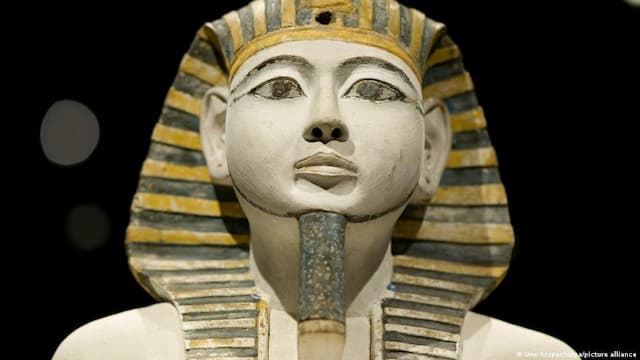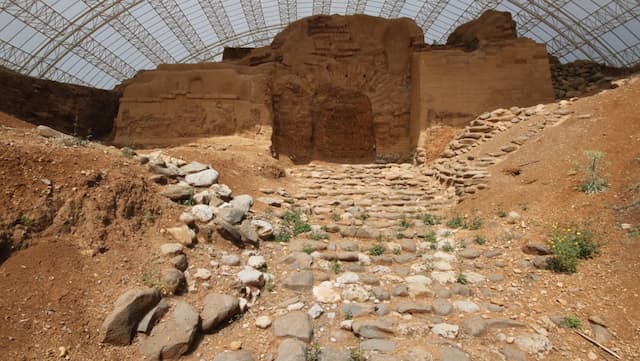Living in Grace and Disgrace (Genesis 40)

Joseph’s story shows us how God deals with injustice.
You’re in good company if you’ve noticed that life isn’t fair. Joseph had every reason to be bitter over how his brothers sold him out, and his boss falsely accused him. Prison walls offer no choices. Every morning Joseph wakes to this meaningless existence.
Others feel the same in this prison. Joseph finds meaning in caring for them. But one morning they’re more glum than usual, troubled by dreams.
The cupbearer trusts Joseph. In his dream he was serving Pharoah wine from a three-branch vine that budded and blossomed and ripened as he watched. Joseph explains what God was telling him:
Genesis 40:13 (NIV)
Within three days Pharaoh will lift up your head and restore you to your position, and you will put Pharaoh’s cup in his hand, just as you used to do when you were his cupbearer.
A glimmer of hope just shone into that dark cell. If Pharaoh would release the cupbearer, might he release Joseph too? Could this guy be Joseph’s get-out-of-jail card?
Joseph asks the cupbearer to reciprocate his kindness:
Genesis 40:14–15 (NIV)
14 When all goes well with you, remember me and show me kindness; mention me to Pharaoh and get me out of this prison. 15 I was forcibly carried off from the land of the Hebrews, and even here I have done nothing to deserve being put in a dungeon.
The baker listens in, daring to hope he might be saved too. In his dream he was serving bread to Pharoah — three baskets full. As he approached Pharaoh, the birds ate the bread from the baskets on his head. Joseph explains what God was telling him:
Genesis 40:19 (NIV)
Within three days Pharaoh will lift off your head and impale your body on a pole. And the birds will eat away your flesh.
Why doesn’t God intervene to prevent such horror? God gave the man a dream, but he doesn’t stop a violent ruler from hanging him publicly, without a trial, as a political statement that this is what happens to anyone who messes with Pharoah. Why doesn’t God save him? And Joseph.
Three days later, Pharoah is celebrating himself. A tyrant’s birthday is always an opportunity to show off his power (compare Matthew 14:6).
Pharoah’s face has two sides. One rewards the cupbearer, so everyone knows who butters their bread. The other spills the baker’s blood. Whether the man deserved it or not is irrelevant. All that matters is that people love and fear Pharoah.
Then the final tragic twist:
Genesis 40:23 (NIV)
The chief cupbearer, however, did not remember Joseph; he forgot him.
Can you identify with Joseph? This seems to be the story of God’s people. Get me out of here (40:14) was Joseph’s plea. It’s the same verb used of the exodus (Exodus 3:10-12; 6:6-27; 12:17-51; 13:3-16; 14:8-11; 16:1-32; 20:2 etc). And the exile (Ezekiel 20:6, 10, 34, 38, 41 etc.)
How God reigns
We wish God would stop the injustice now. We want him to dethrone the Pharaohs of this world and assert his own reign instead.
The craziest thing about God is that he chooses to partner with us rather than to dominate us as evil does. Forcing his will on the world is not God’s path to divine justice. Instead, God comes to be with us in our pain.
While Joseph was there in prison, the Lord was with Joseph and showed him kindness (39:21). Kindness (ḥě·sěḏ) is a relational word. It’s about mutual loyalty, reciprocity in relationship.
It’s the same word Joseph used when he interpreted the cupbearer’s dream and asked him to return the kindness (ḥě·sěḏ) (40:14). Unfortunately, the king’s cupbearer forgot his obligation to Joseph when things worked out for him.
This is the weakness in God’s plan. God intends to restore his reign not by force but by kindness. But what if people don’t respond to God’s kindness? Will Joseph (and God’s people) remain in prison?
God is our true sovereign. Always was, always is, always will be. Though it wasn’t what he intended in the beginning, God gave the power of life and death to human rulers in order to limit violence (Genesis 9:1-6). That’s the reason we have nations (Genesis 10). Ultimately, God calls the nations to recognize the leader he has appointed (Matthew 28:18-20). It takes millennia of God’s patience, but his plan will work.
In the meantime, God’s people are still suffering as we wait for his grace to take root like a mustard seed. His grace brings us into covenant relationship with him. It’s undeserved (unearned), but it places us into relationship with God where we have an obligation to God. God’s grace gives us his Christ as our Lord, with the obligation to recognize his Christ and live under his leadership. For a masterful study of how grace works, see John Barclay’s Paul and the Gift (review) or the shorter Paul and the Power of Grace (Eerdmans, 2015, 2020).
Conclusion
The patient love of God is the most beautiful — and the most frustrating — expression of his sovereign character.
We’re living in a world where the cupbearer is impelled to fame, the baker is impaled in shame, and Joseph languishes in prison. Whenever God’s plans include us, we seem to run into trouble.
Genesis 40 ends with Joseph still in prison, but it’s not where God’s plans end. God is still at work, revealing himself to people: When two full years had passed, Pharoah had a dream (41:1).
Pharaoh lifted up the cupbearer’s head — restoring his honour and his life. Pharaoh lifted up the baker’s head — destroying his honour and his life. But Pharaoh is not the ultimate authority determining whether people are decorated or decimated:
John 12:32–33 (NIV)
“And I, when I am lifted up from the earth, will draw all people to myself.” 33 He said this to show the kind of death he was going to die.
The rulers of this world raised up God’s anointed on a cross. Yet the life-giving grace of God raised him up to reign. Grace is God’s sovereign kindness. God reveals his power in weakness. That’s why we’re still suffering as we anticipate the full restoration of his reign through his grace.
What others are saying
Walter Brueggemann, Genesis, Interpretation (Atlanta, GA: John Knox Press, 1982), 325:
The dream of God for Joseph is not for times of obvious credibility. It is for times when the claims run against the evidence. And Joseph is left to wait even as father Abraham had. The butler forgets Joseph now, even as Egypt will forget him (cf. Exod. 1:8). Joseph is left with this question: Is there a remembering done by Yahweh beyond the forgetting of the empire? Joseph does not know. The butler does not care.
Related posts
- Son of man: suffering king (Mt 16:21–17:23)
- But his enemies are still here (Mt 28:11-15)
- Divine sovereignty and human suffering (Zech 14:1-5)
- Peace and grace: the greeting that can deliver (Eph 6:23-24)
- Finding God in an unjust world (Gen 39)
Seeking to understand Jesus in the terms he chose to describe himself: son of man (his identity), and kingdom of God (his mission). Riverview Church, Perth, Western Australia
View all posts by Allen Browne











